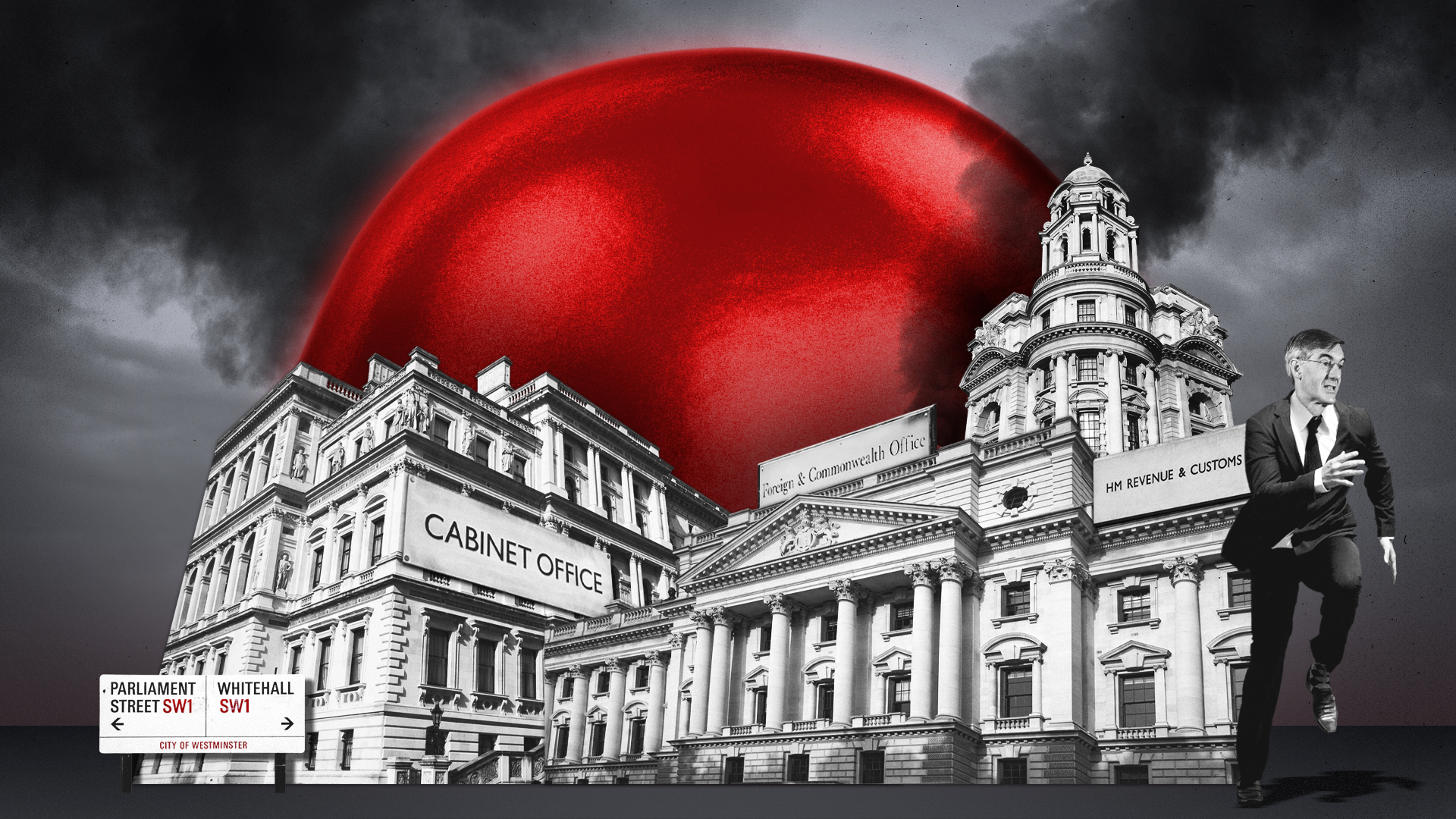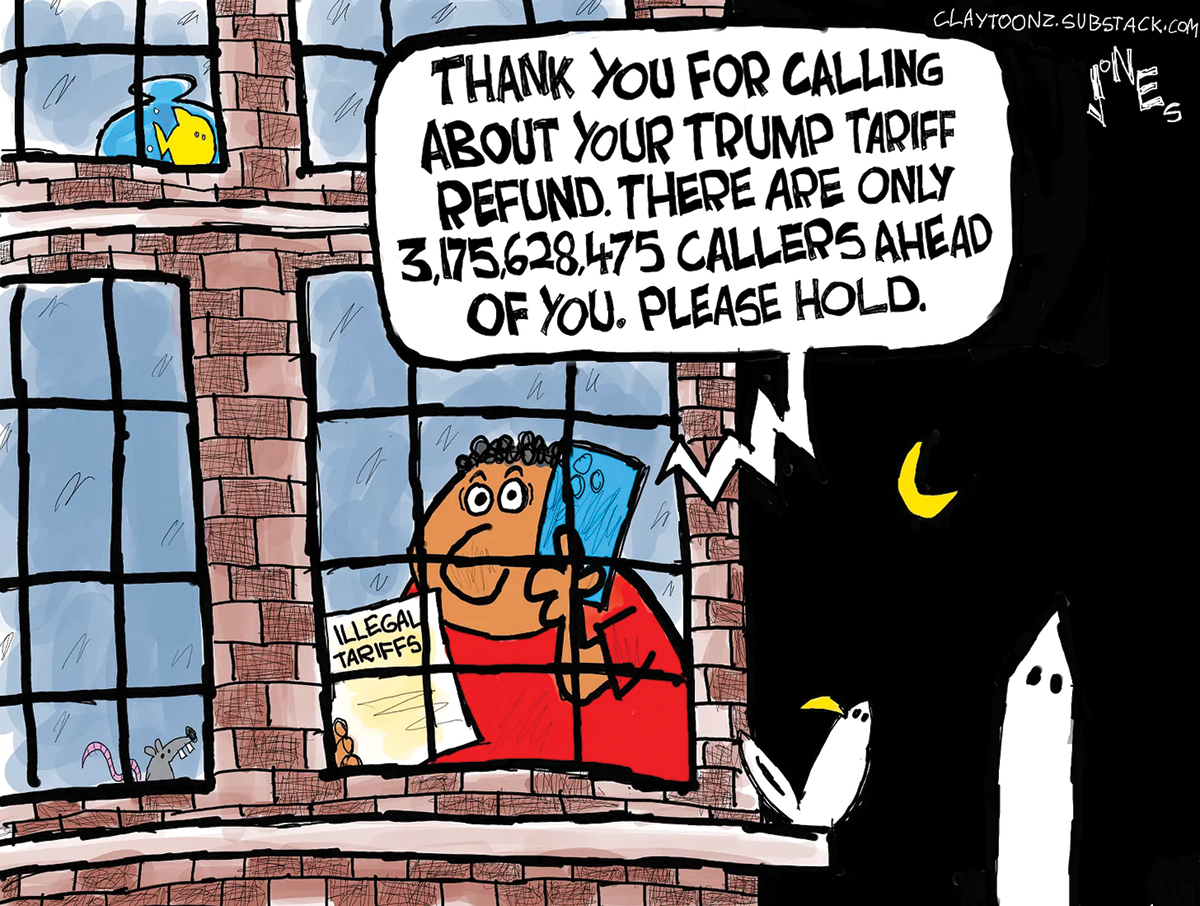Attack of ‘the Blob’: is the civil service working against the Tories?
Boris Johnson is latest high-profile Tory to clash with cabinet office in series of recent scandals

A free daily email with the biggest news stories of the day – and the best features from TheWeek.com
You are now subscribed
Your newsletter sign-up was successful
Boris Johnson was referred to the police last night over more allegations of potentially rule-breaking gatherings during Covid lockdowns.
The cabinet office reportedly handed over the former prime minister’s official diaries after they were uncovered by lawyers working on his submission to the Partygate inquiry, and they allegedly show visits to the grace-and-favour residence, Chequers, and Downing Street, which would constitute a breach in pandemic guidelines.
This assertion “is totally untrue”, said a spokesperson for Johnson. “No contact was made with Mr Johnson before these incorrect allegations were made both to the police and to the privileges committee. This is both bizarre and unacceptable.”
The Week
Escape your echo chamber. Get the facts behind the news, plus analysis from multiple perspectives.

Sign up for The Week's Free Newsletters
From our morning news briefing to a weekly Good News Newsletter, get the best of The Week delivered directly to your inbox.
From our morning news briefing to a weekly Good News Newsletter, get the best of The Week delivered directly to your inbox.
Cabinet office sources reportedly said that no minister was involved. “In line with obligations in the civil service code, this material has been passed to the relevant authorities and it is now a matter for them,” a spokesperson said.
Allies of Johnson have accused Cabinet Office Secretary Oliver Dowden, who replaced Dominic Raab as deputy prime minister and is described as “Rishi Sunak’s right-hand man”, of being behind the move, said Daily Express political correspondent, Christian Calgie. “One ally damningly called the deputy prime minister: ‘a compliant tool of the blob’.”
Johnson is the latest high-profile Conservative to clash with the civil service, after recent scandals involving Home Secretary Suella Braverman and Raab, who resigned as deputy PM earlier this month.
What did the papers say?
Braverman was this week accused of asking civil servants to help her avoid a speeding fine last summer, when she was attorney general, by arranging a private driving awareness course. When they refused, she accepted points on her licence. Sunak has officially declared that she did not break ministerial code.
A free daily email with the biggest news stories of the day – and the best features from TheWeek.com
Braverman “is the latest target of the blob”, said Tim Stanley in The Daily Telegraph, “that cloud of resistance that descends mysteriously on right-wing ministers and sensible ideas.”
In March, a campaign email sent in her name accused “an activist blob of left-wing lawyers, civil servants and the Labour Party” of blocking efforts to curb cross-Channel migration. She claimed she did not write or see the email.
The blob “has demonstrated equal opportunity in obstructing the careers of Tories of colour, hitting out at both Priti Patel and Braverman”, said the newspaper. But the “threat” they pose to “the blob” is that they are “instinctual conservatives, proudly British… who can’t be gently persuaded out of their beliefs”.
Use of the term “the blob” to criticise bureacracy dates back to the Reagan era, and references a 1958 sci-fi film “The Blob”, starring a gelatinous space alien that consumes everything.
As education secretary, Michael Gove adopted it “with a slight twist”, wrote columnist Daniel Finkelstein for The Times, to blame bureaucracy for blocking his reforms.
It has since been popularised as a Tory insult against the civil service, by former party svengali Dominic Cummings and, recently, Jacob Rees-Mogg, referring to the government U-turn on the proposed Retained EU Law Bill.
The Blob is now “everywhere to be found in Conservative argument”, he wrote, “eating everything in its path, including common sense”.
Raab, who was forced to stand down over allegations of bullying, also claimed he had faced a coordinated attack by “activist” civil servants. It is “a paranoid strand of socialist thinking”, Finkelstein wrote. Everyone from the civil service to lawyers, the EU and people with degrees are the Blob – “and the Blob is to blame for everything”.
Civil servants are “an obvious target” for “failing ministers” to scapegoat, wrote Patience Wheatcroft, former editor of The Wall Street Journal (Europe), for Prospect. “They cannot engage in the public blame game”, and risk being sacked should they challenge their bosses.
The allegations are “a very carefully choreographed narrative”, wrote one anonymous civil servant for The Guardian. The idea of a civil service agenda is “an archetypal ‘deep state’ trope” that has been “cultivated and amplified by the right-wing media to serve as mood music for this government’s war against the very concept of checks and balances”, they wrote.
And “this absurd, toxic take” overlooks the vaccine roll-out, the cost-of-living support package and the response to the Ukraine crisis as recent examples, they said.
The “underlying motive” for the “repeated attacks on civil servants in recent years seems to point towards encouraging the abandonment of impartiality, particularly where that can help hide the impact of government policies on the poor, the disabled, the young and other demographics less likely to vote Tory.”
What happens next?
Steven Swinford, political editor of The Times, tweeted that Johnson is severing ties with the government-appointed lawyers representing him during the Covid inquiry, as he has “lost confidence” in the cabinet office. He will appoint his own legal team, funded by taxpayers. The cabinet office told the Express that civil servants were simply doing their job in passing information to the police, as required by the Civil Service Code.
Thames Valley Police and the Metropolitan Police said they were assessing potential breaches of the Health Protection Regulations between June 2020 and May 2021 at Chequers, when the UK moved in and out of lockdowns.
While “it may be that the civil service needs reform”, its expertise and experience is “invaluable” when governments change so rapidly, said Wheatcroft for Prospect.
“There is a bigger fightback under way,” she said, with former civil servants speaking up, “most notably Lord Wilson of Dinton, who was cabinet secretary and head of the civil service from 1998 until 2002”, who dismissed Mogg’s criticisms of the civil service as “ill judged and grossly unfair”.
Harriet Marsden is a senior staff writer and podcast panellist for The Week, covering world news and writing the weekly Global Digest newsletter. Before joining the site in 2023, she was a freelance journalist for seven years, working for The Guardian, The Times and The Independent among others, and regularly appearing on radio shows. In 2021, she was awarded the “journalist-at-large” fellowship by the Local Trust charity, and spent a year travelling independently to some of England’s most deprived areas to write about community activism. She has a master’s in international journalism from City University, and has also worked in Bolivia, Colombia and Spain.
-
 Mexico kills drug lord El Mencho, sparking chaos
Mexico kills drug lord El Mencho, sparking chaosSpeed Read Cartel members responded with a wave of retaliatory violence across the country
-
 Trump’s tariff loss at Supreme Court roils trade
Trump’s tariff loss at Supreme Court roils tradeSpeed Read The court ruled that President Donald Trump’s most sweeping tariffs were unlawful
-
 Political cartoons for February 23
Political cartoons for February 23Cartoons Monday’s political cartoons include tariff refunds, Epstein Island visits, and more
-
 Can Keir Starmer save the Chagos deal?
Can Keir Starmer save the Chagos deal?Today's Big Question Opponents confident they can scupper controversial agreement as PM faces a race against time to get it over the line
-
 How are Democrats turning DOJ lemons into partisan lemonade?
How are Democrats turning DOJ lemons into partisan lemonade?TODAY’S BIG QUESTION As the Trump administration continues to try — and fail — at indicting its political enemies, Democratic lawmakers have begun seizing the moment for themselves
-
 How did ‘wine moms’ become the face of anti-ICE protests?
How did ‘wine moms’ become the face of anti-ICE protests?Today’s Big Question Women lead the resistance to Trump’s deportations
-
 How are Democrats trying to reform ICE?
How are Democrats trying to reform ICE?Today’s Big Question Democratic leadership has put forth several demands for the agency
-
 Why is Tulsi Gabbard trying to relitigate the 2020 election now?
Why is Tulsi Gabbard trying to relitigate the 2020 election now?Today's Big Question Trump has never conceded his loss that year
-
 Will Democrats impeach Kristi Noem?
Will Democrats impeach Kristi Noem?Today’s Big Question Centrists, lefty activists also debate abolishing ICE
-
 Do oil companies really want to invest in Venezuela?
Do oil companies really want to invest in Venezuela?Today’s Big Question Trump claims control over crude reserves, but challenges loom
-
 What is China doing in Latin America?
What is China doing in Latin America?Today’s Big Question Beijing offers itself as an alternative to US dominance